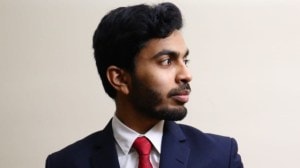UNITED NATIONS Secretary-General Antonio Guterres, who arrived in New Delhi on Friday for the G20 Summit, said that he is not very hopeful of a peace solution for the Russia-Ukraine conflict in the near future, but all efforts of mediation were important and “everything possible” needs to be done to end the situation.
When asked if India has the credibility to be a mediator in the Russia-Ukraine conflict, Guterres told reporters, “When you have a conflict, all efforts of mediation are extremely important. I am not very hopeful that you will have a peace solution in the immediate future. I believe the two parties have decided to move on with the conflict and obviously, we need to try to do everything possible for this dramatic situation to find an end.”

The chief of the United Nations, which has 193 countries as member-states, said that if the world is indeed one global family, we today resemble a rather dysfunctional one.
Story continues below this ad
“I hope India’s presidency of the G20 will help lead to the kind of transformative change our world so desperately needs in line with the repeated commitment of India to act on the behalf of Global South and its determination to pursue the development agenda,” he said, welcoming India’s focus on ‘One Earth, One Family, One Future’.
This phrase inspired by the Maha Upanishad, he said, finds profound resonance in today’s world: not just as a timeless ideal – but as an indictment of our times. “Divisions are growing, tensions are flaring up, and trust is eroding – which together raise the spectre of fragmentation, and ultimately, confrontation,” he said.
This fracturing would be deeply concerning in the best of times, but in our times it spells catastrophe, Guterres said. Our world is in a difficult moment of transition, he said, adding that “the future is multipolar, but our multilateral institutions reflect a bygone age”.
He said India has assumed during the G20 presidency a strong priority on the development agenda and at the same time, doing everything possible to represent the interest of the Global South in the preparation of the summit. “Now, the results will be what they will be, and the responsibility is the G20 in its entirety. But India has indeed corresponded to its promise not only to speak on behalf of the Global South, but to put the development agenda in the centre of the G20 work.”
Story continues below this ad
The UN chief also called for an overhaul of multilateral institutions such as the UN Security Council to reflect today’s world. “The global financial architecture is outdated, dysfunctional, and unfair. It requires deep, structural reform. And the same can be said of the United Nations Security Council,” he said.
We need effective international institutions rooted in 21st-century realities based on the UN Charter and international law, Guterres said. “Some people think that if the world is multipolar, then peace will come by itself. It is not true. When one looks at the UNSC, they do not reflect today’s world. They reflect the world at the end of the Second World War in 1945. But many things have changed,” he said.
When these institutions were created, the majority of countries would not even exist as independent countries, they were still colonial regimes, he said. If we want multilateral institutions to work properly, we need to adapt them to reflect the reality of today.
The UN chief also stressed upon the need to act on the climate goals, since there is “no time to lose”. G20 leaders must show leadership on climate, since they are responsible for 80 per cent of global emissions, he said.
Story continues below this ad
Presenting an Acceleration Agenda, he called on developed countries to reach net-zero as close as possible to 2040, and emerging economies as close as possible to 2050. He also called for phasing out coal by 2030 in OECD countries and 2040 in all others, while also ending all licensing or funding of new fossil fuel projects.
Guterres also batted for “climate justice”.
“Twenty of the most dramatic hot spots in the world are in Africa, and Africa is the poorest continent. So there is a basic injustice that needs to be addressed,” he said. “The climate crisis is worsening dramatically but the collective response is lacking in ambition, credibility, and urgency. Wars and conflicts are multiplying but efforts to advance peace are faltering. New technologies are raising red flags but actions to contain the risks remain too slow.”
“I have come to the G20 with a simple but urgent appeal: we cannot go on like this. We must come together and act together for the common good,” he said.
On being asked about the impact of the heads of Russia and China – which are also members of the UN Security Council – not attending the summit, he said, “Despite who represents each country in this summit, the responsibility of the country is the same.”









